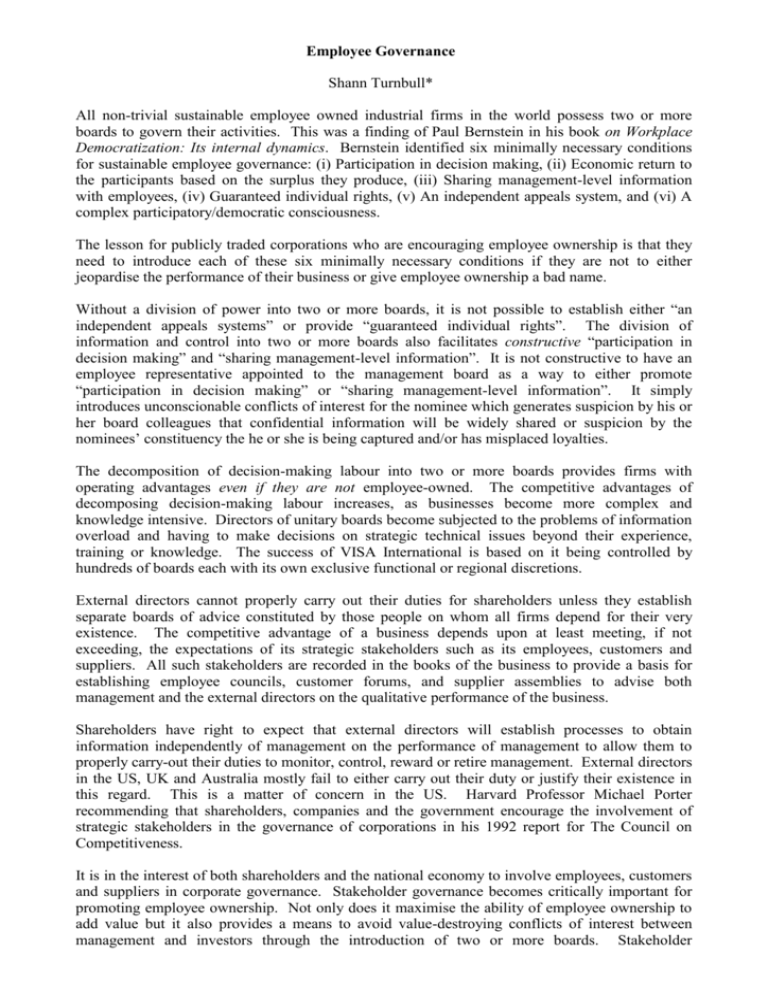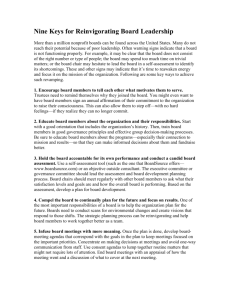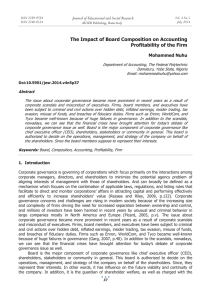Employee Governance
advertisement

Employee Governance Shann Turnbull* All non-trivial sustainable employee owned industrial firms in the world possess two or more boards to govern their activities. This was a finding of Paul Bernstein in his book on Workplace Democratization: Its internal dynamics. Bernstein identified six minimally necessary conditions for sustainable employee governance: (i) Participation in decision making, (ii) Economic return to the participants based on the surplus they produce, (iii) Sharing management-level information with employees, (iv) Guaranteed individual rights, (v) An independent appeals system, and (vi) A complex participatory/democratic consciousness. The lesson for publicly traded corporations who are encouraging employee ownership is that they need to introduce each of these six minimally necessary conditions if they are not to either jeopardise the performance of their business or give employee ownership a bad name. Without a division of power into two or more boards, it is not possible to establish either “an independent appeals systems” or provide “guaranteed individual rights”. The division of information and control into two or more boards also facilitates constructive “participation in decision making” and “sharing management-level information”. It is not constructive to have an employee representative appointed to the management board as a way to either promote “participation in decision making” or “sharing management-level information”. It simply introduces unconscionable conflicts of interest for the nominee which generates suspicion by his or her board colleagues that confidential information will be widely shared or suspicion by the nominees’ constituency the he or she is being captured and/or has misplaced loyalties. The decomposition of decision-making labour into two or more boards provides firms with operating advantages even if they are not employee-owned. The competitive advantages of decomposing decision-making labour increases, as businesses become more complex and knowledge intensive. Directors of unitary boards become subjected to the problems of information overload and having to make decisions on strategic technical issues beyond their experience, training or knowledge. The success of VISA International is based on it being controlled by hundreds of boards each with its own exclusive functional or regional discretions. External directors cannot properly carry out their duties for shareholders unless they establish separate boards of advice constituted by those people on whom all firms depend for their very existence. The competitive advantage of a business depends upon at least meeting, if not exceeding, the expectations of its strategic stakeholders such as its employees, customers and suppliers. All such stakeholders are recorded in the books of the business to provide a basis for establishing employee councils, customer forums, and supplier assemblies to advise both management and the external directors on the qualitative performance of the business. Shareholders have right to expect that external directors will establish processes to obtain information independently of management on the performance of management to allow them to properly carry-out their duties to monitor, control, reward or retire management. External directors in the US, UK and Australia mostly fail to either carry out their duty or justify their existence in this regard. This is a matter of concern in the US. Harvard Professor Michael Porter recommending that shareholders, companies and the government encourage the involvement of strategic stakeholders in the governance of corporations in his 1992 report for The Council on Competitiveness. It is in the interest of both shareholders and the national economy to involve employees, customers and suppliers in corporate governance. Stakeholder governance becomes critically important for promoting employee ownership. Not only does it maximise the ability of employee ownership to add value but it also provides a means to avoid value-destroying conflicts of interest between management and investors through the introduction of two or more boards. Stakeholder governance also avoids the confidence destroying conflicts of interests, which arise between management and employees when the employees become significant owners as noted by Bernstein. Policies for encouraging employee ownership will become counter productive as employed shareholders increase unless stakeholder governance is also introduced. The UK government provides a number of tax incentives to encourage employee ownership and complementing these policies it is now considering changing corporate law to make directors accountable to "employees, creditors, customers, the environment, and the wider community". This broader view of directors’ duties was recommended to the Government by an inquiry held by the Royal Society for Arts into "Tomorrow's Company". This private sector initiative, led by business leaders, recommended an "inclusive approach" to corporate governance. An additional incentive for formally including stakeholders in the governance of publicly traded firms is the lack of involvement by shareholders in making directors and management accountable. Institutional investors are now the largest owners of public companies but they mostly fail to take an active interest in making directors accountable. The number of significant institutional investors in either Australia or the UK is less than the number of members in either national Parliament. So even if institutions were active in corporate governance it would raise questions as to the economic legitimacy of democracy. Even in 1976, when the proportion of institutional ownership was less than half its present level, Peter Drucker, wrote, The Unseen Revolution: How Pension Fund Socialism Came to America. The irony is that while more voters than ever are sharing in the ownership of the means of production, control is becoming ever more concentrated and weaker. This is undermining the accountability of firms to create value for shareholders and the economy and the political legitimacy of corporations. Employee ownership provides a way to not only improve economic performance but also to give political legitimacy to business. However, for employee ownership to achieve both objectives, companies will need to introduce the six minimally necessary conditions identified by Bernstein. This in turn will depend upon firms introducing stakeholder governance with a constructive division of power between two or more boards and stakeholder councils. oooOOOooo 052599/951 Shann Turnbull is a founding director of the Australian Employee Ownership Association. He attended the 1998 conference at which the UK government announced its reform of company law to respond to a speech on a 'Stakeholder View: Corporate Governance in the 21st. Century’ by Mr. John Monks, the General Secretary of the Trade Union Council. Note to editor Should you note that the reasons for the AEOA supporting the proposals of Senator Andrew Murray to introduce a Corporate Governance Board for all publicly traded firms in Australia are set out in this article?











